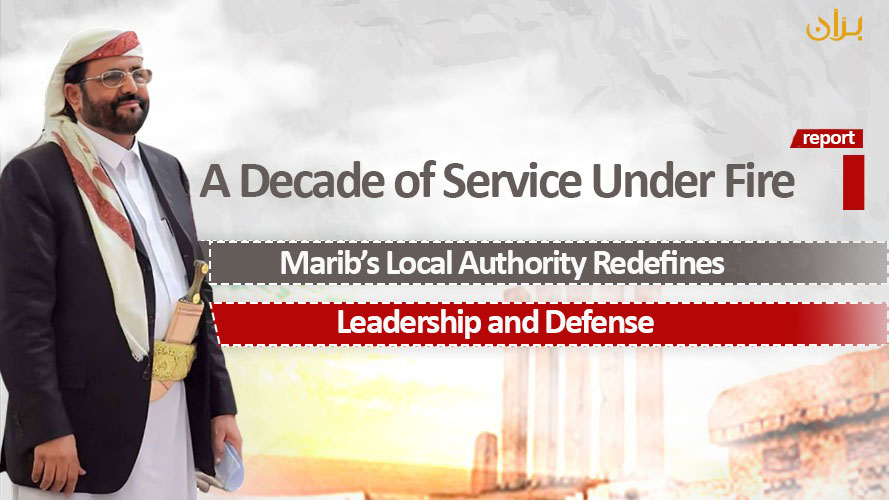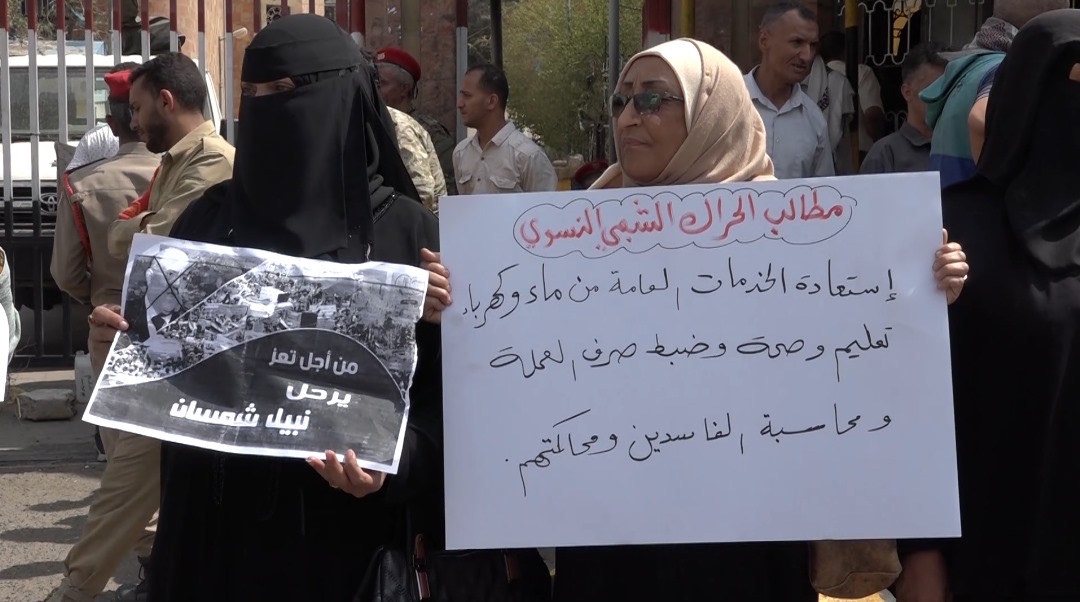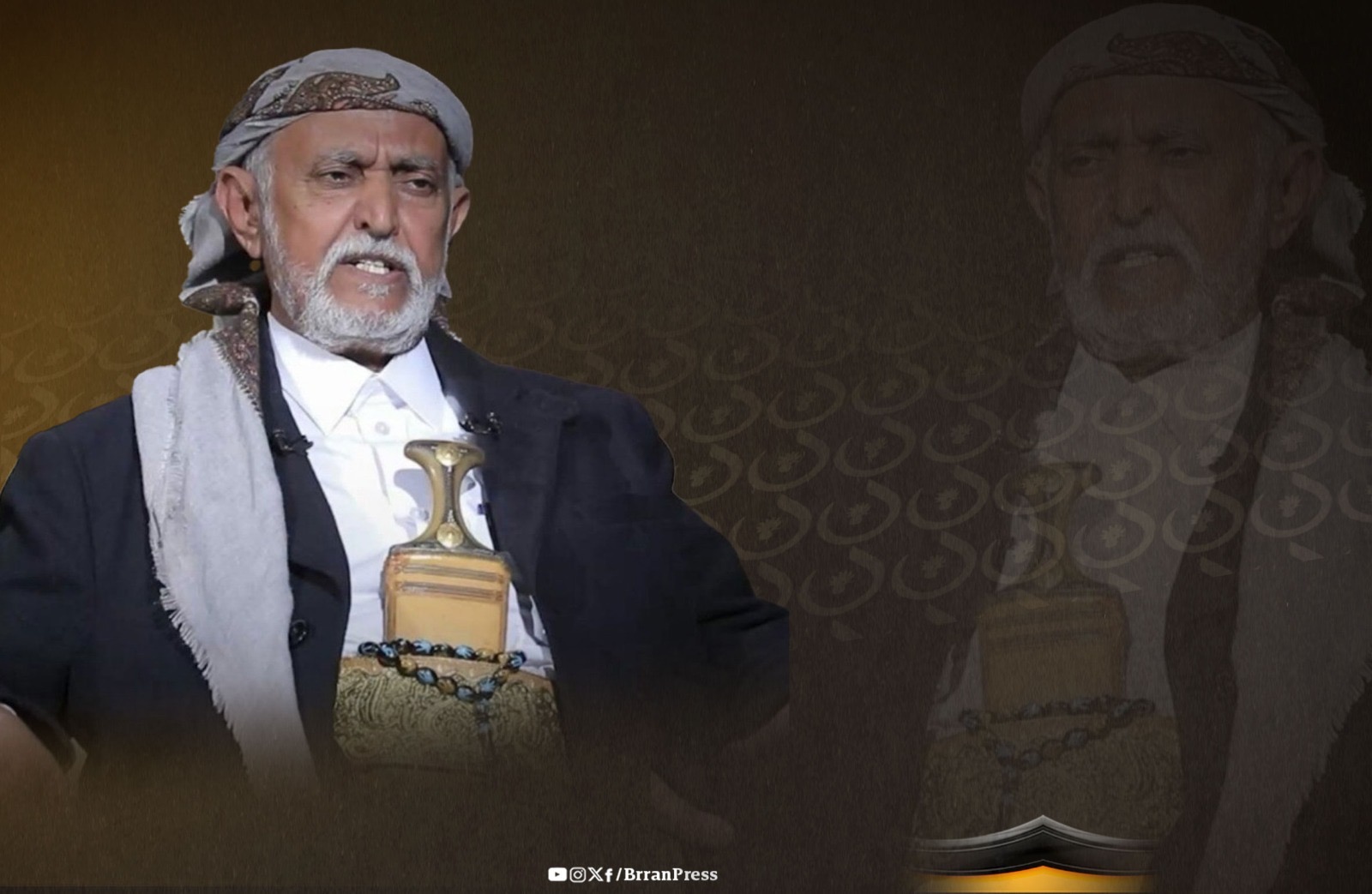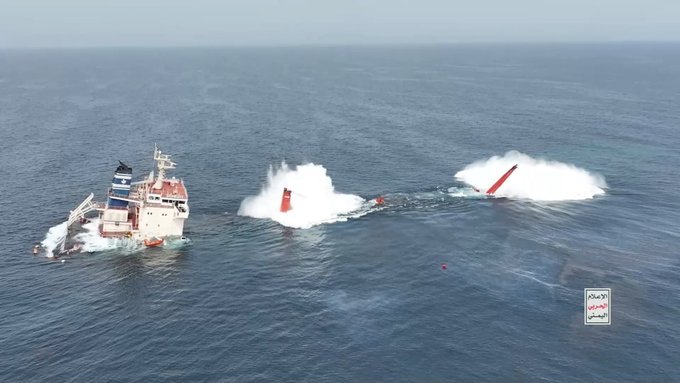
Barran Press - Reports Unit:
Ten years ago, as the Houthi movement advanced towards the capital, Sana’a, they targeted local authorities and communities from their stronghold in Saada, reaching the northern outskirts of the capital. Amidst the nationwide turmoil, Marib province in northeastern Yemen emerged as a bastion of resistance, forming the nucleus of popular resistance and inspiring other provinces to confront the threat.
Marib maintained its distinction as a stronghold of the Yemeni Republic, becoming a cornerstone in the national struggle against the Iranian-backed Houthi agenda.
A National Leader
Despite Marib’s resources and strengths, observers attribute its historic stance primarily to the leadership of Governor Sultan bin Ali al-Arada. He emerged as an exceptional and inspiring national leader, uniting military, tribal, social, political, economic, and geographical forces under a framework that embodies the spirit of the Republic and the gains of the September and October Revolutions.
Yemeni journalist Marib al-Ward remarked to "Barran Press," “Fortunately, the governor hails from Marib and is a figure who understands his role and responsibilities.” He noted that Sheikh Sultan is one of the few national figures who has become a consensus choice for his pivotal role in preserving the Republic and resisting the Houthis. “He allocated significant local resources to support the resistance,” added al-Ward.
A Unified Front
Sheikh Sultan al-Arada’s leadership fostered a “positive relationship, almost for the first time, between the tribes and the local authority,” creating a “relationship of integration, harmony, and full coordination.” This unified stance extended to political parties in Marib, which differed markedly from those in other provinces. According to al-Ward, this alliance of tribes, local authorities, and political parties formed a cohesive unit to face the Houthis, focusing all resources and efforts on the battle, ultimately breaking the Houthi advance.
Saud al-Yousefi, deputy head of the Yemeni People's Congress in Marib, noted al-Arada’s significant role in “uniting the political, military, and tribal fabric” when Sana’a fell. At that critical moment, he said, “The people of Marib, under Sheikh Sultan’s leadership, mobilized to the Matareh before the coalition arrived, with political parties and tribal communities joining forces against the Houthi onslaught.”
National Vision
Even before the Houthi coup, particularly on August 25-26, 2014, al-Arada initiated consultative meetings with tribes, political parties, civil society, and security and military committees. These gatherings unified visions among local authorities, security and military leaders, party heads, and tribal chiefs, establishing a clear stance against the Houthi actions, especially as they began encircling Sana’a.
During this period, the local authority in Marib coordinated internal unity while calling everyone to rally around the state and reject any tactical alliances with the Houthis. This led to an unannounced mobilization, escalating in response to the events leading up to the Houthis’ takeover of Sana’a on September 21, 2014.
Throughout these developments, Marib demonstrated keen insight and national awareness, understanding the gravity of a “theocratic regression” seizing the state. The exceptional leadership and spirit of Marib shone through various channels.
Despite intense pressure and temptations from the Houthis to capitulate, Marib remained steadfast, forming a cohesive and unique national identity. It countered organized propaganda campaigns woven by external forces, as well as the media machinery of the coup at that time.
Rejecting the Coup
On September 19, 2014, Marib's local authority and political factions convened to discuss the situation in the capital. They condemned the armed expansion aimed at seizing control of the capital, ministries, and military camps, undermining the state, and fracturing national unity.
The meeting reaffirmed the local authority’s commitment to stand alongside military and security institutions in confronting all forms of violence, sabotage, and extremism.
The local authority and political forces in Marib reiterated their support for the political leadership’s efforts, echoing President Abdrabbuh Mansur Hadi’s call to respect state legitimacy and for armed groups to withdraw from the capital and all provinces without delay.
For months, Marib organized and prepared its ranks, vigilantly monitoring developments in the capital while assessing the militia's adherence to the peace and partnership agreement. Meanwhile, it faced challenges from the militia and its allies in Sana’a, who threatened vital facilities in Marib, including oil and electricity, to create a pretext for attacking the province.
The Historic Declaration of Marib
The Houthi militia failed to adhere to the peace and partnership agreement imposed by force and brokered by the United Nations on the eve of the coup on September 21, 2014. Instead, they continued their advance towards the provinces of Al-Bayda, Ibb, Marib, Taiz, and Al-Hudaydah.
Meanwhile, Marib’s local authority closely monitored the situation, maintaining an active line of communication with President Hadi to receive guidance and prepare for the Houthis' next moves. This vigilance was underscored when the militia kidnapped Dr. Ahmed Awad bin Mubarak, along with the draft constitution, on January 17, 2015, and placed President Hadi under house arrest two days later.
In response, Marib's local authority took a decisive stand. On January 21, 2015, an extraordinary meeting led by Governor Sultan al-Arada convened, attended by civil and military leaders, tribal chiefs, and representatives from various political and social groups in the province. The meeting addressed the “dangerous” events unfolding in the country, particularly the coup against the legitimate transitional president and the outcomes of the National Dialogue and the peace agreement.
The meeting resulted in a declaration of the province's commitment to “protecting oil and gas facilities” and calling upon the honorable citizens to stand with the people of Marib. This declaration effectively severed any recognition of Houthi directives emerging from Sana'a following the siege of President Hadi and the kidnapping of his office director.
A Stronger Stance
Saud al-Yousefi, Deputy Head of the Marib Conference, explained that Marib activated a constitutional clause allowing any province to establish a "Defense and Security Committee" under the governor's leadership, with participation from military commanders and political parties. He stated, “We had no choice but to cut our political and administrative ties with Sana'a and mobilize our forces against the Houthi invasion.”
On February 15, 2015, the security committee and political parties in Marib held a significant meeting to discuss the situation following the Houthis' declaration of what they termed a “constitutional announcement.” The meeting concluded with a statement rejecting this declaration, labeling it a coup against the republic, unity, and the outcomes of the National Dialogue.
The statement emphasized that no decisions or actions taken in Sana'a would be recognized, and the security committee would continue to implement necessary measures to ensure Marib's safety and stability. They called on the local population to actively participate in these efforts, safeguarding their history and community.
A Call for Gulf Support
Notably, the February 2015 leadership meeting in Marib urged Gulf Cooperation Council (GCC) countries to “assume their responsibilities towards Yemen.” This appeal reflected a keen political awareness of the severity of the Houthi control over Sana'a and the broader regional implications, necessitating support for Yemen's legitimacy.
Just a month and a half later, the “Decisive Storm” operation began, led by Saudi Arabia to restore the legitimate government and state amid ongoing Houthi aggression against various Yemeni provinces, particularly Taiz and Aden.
Commitment to the State
In a mid-February 2015 interview with Al Jazeera, Governor al-Arada reiterated Marib's steadfast position, emphasizing the province's commitment to a lawful and orderly governance system. He stated that Marib would uphold its historic responsibilities following the Houthi coup, ensuring the continuity of services and resources while rejecting armed groups.
When President Hadi managed to escape Sana'a on February 22, he traveled to Aden accompanied by a large official and tribal delegation from Marib, reaffirming their commitment to constitutional legitimacy and discussing ongoing developments.
Services Amidst Conflict
As fierce battles raged on the outskirts of Marib, the province's executive offices worked diligently to maintain essential services. Local officials, despite the dangers, remained committed to their duties under bombardment.
Dr. Abdrabbuh Miftah, Marib’s Deputy Governor, noted that even during intense fighting, they ensured the continuity of services like water and electricity, showcasing remarkable resilience.
A Strong National Commitment
Yasser Alraeeini, former Minister of State for National Dialogue Outcomes, praised Marib's local authority for its exemplary resilience and leadership during 2014. He highlighted the coordination efforts led by Governor al-Arada, which united various tribal and political forces against the militia, cementing Marib's role as a bulwark of national defense.
A Solid Republican Framework
Dr. Qasem Buhaibeh, Minister of Public Health, lauded Marib's local authority for shouldering the largest national responsibility since the Houthi coup. He described the collective efforts in Marib as a “solid republican framework,” vital for defending Yemen against adversity.
The local authority successfully managed all vital institutions and facilities, demonstrating exceptional leadership since that pivotal moment.
Historic Stance in Marib
In a recent statement, Abdullah Abu al-Ghaith, Deputy Chairman of the Yemeni Shura Council, described the local authority's decision in Marib to confront the Houthis and declare a state of emergency as a "historic stance."
He remarked, "Everyone stood together—local, military, security, civil, tribal, and political authorities—showing courage and determination. They faced the Houthis as a formidable barrier, breaking their arrogance and shattering their ambitions to seize Marib and beyond."
As we mark the tenth anniversary of Marib's resistance, Abu al-Ghaith highlighted the critical role played by the local leadership, particularly Governor Sultan al-Arada, alongside the free people of Marib and its tribes. "They have made significant contributions to halting the expansion of Iranian-backed Houthi forces and their destructive agenda in Yemen and the region."
He emphasized that history will remember this role, and Yemenis take pride in their valor and sacrifices. "It is crucial to draw lessons from Marib's experience," he added, urging unity and prioritizing the nation’s interests over individual differences.
Abu al-Ghaith called on academics to focus their research on Marib's exemplary efforts in preserving the state and its institutions, suggesting that these experiences be included in educational curricula. He encouraged all tribes, parties, and national forces to learn from Marib's example to maintain national unity and support the restoration of constitutional legitimacy and state institutions.





